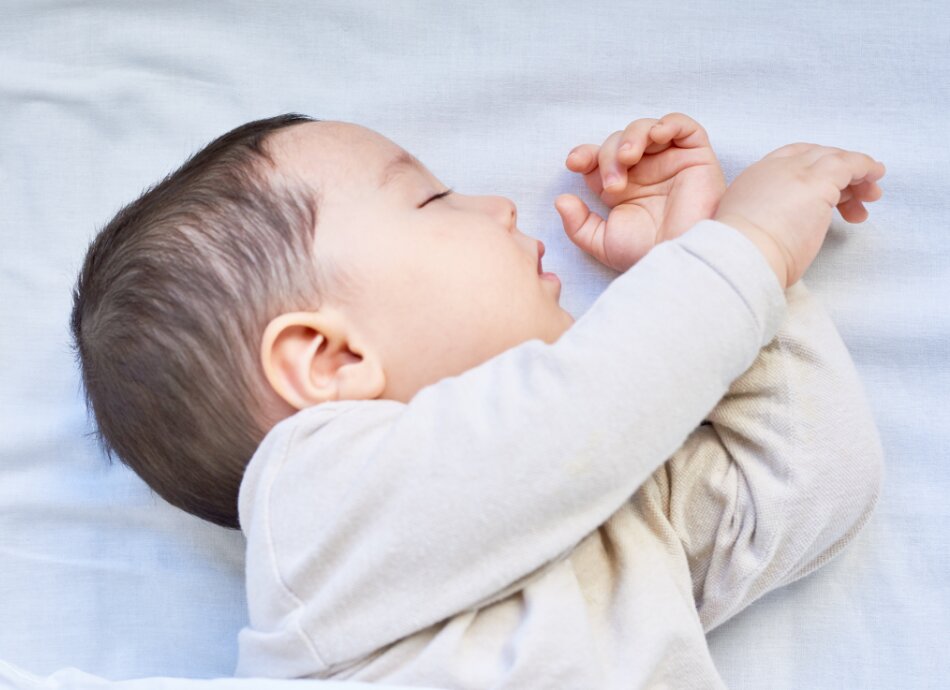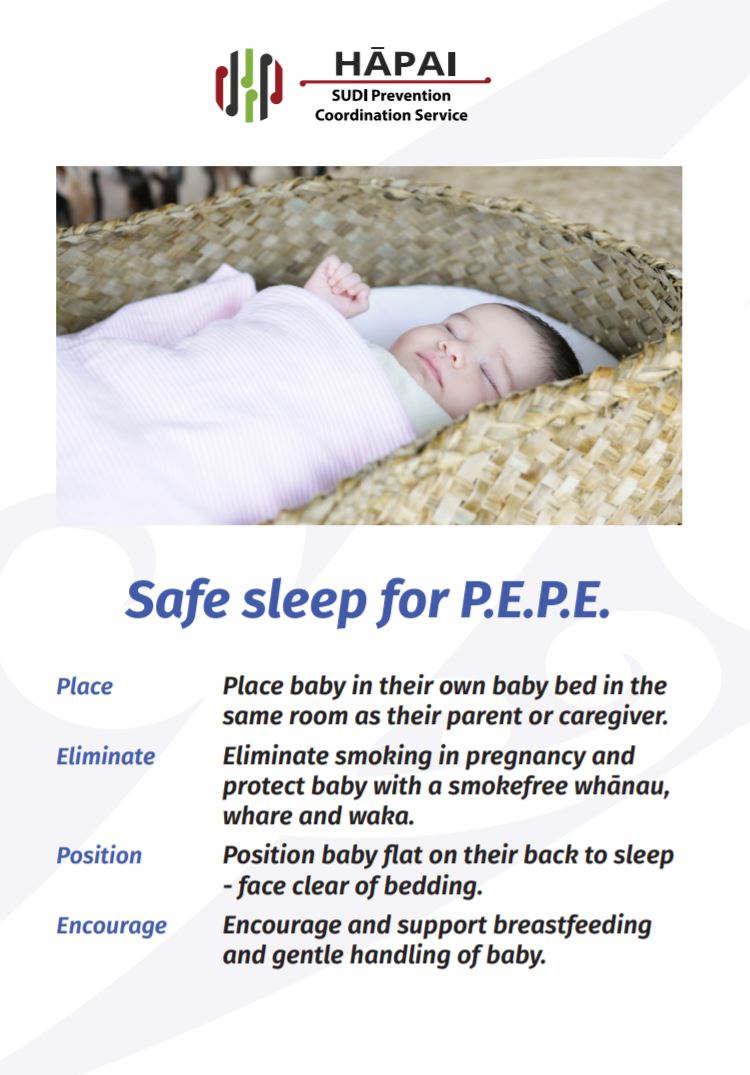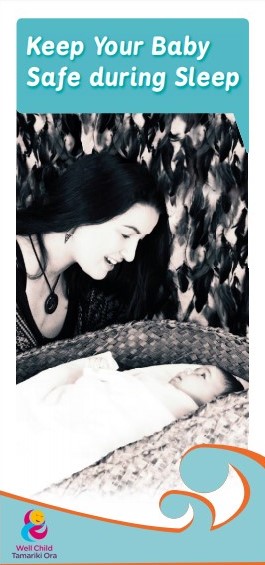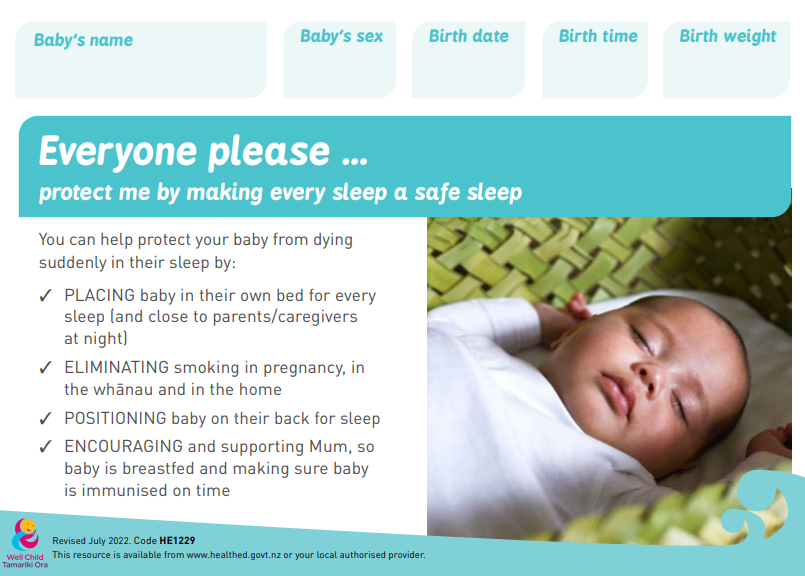If you're a frequent visitor to Healthify, why not share our site with a friend? Don't forget you can also browse Healthify without using your phone data.
Safe sleeping for your baby
Key points about safe sleeping for your baby
- There are many ways parents and caregivers can help keep tamariki safe when they sleep.
- Sudden unexpected death in infancy, also known as SUDI or cot death, is a risk for babies aged under 12 months.
- Many of these deaths are avoidable.
- Here are some things you can do to help give your baby a safe sleep.

1. Put your baby to sleep on their back
Put your baby to sleep on their back near the end of their cot, bassinet or pēpi-pod so they can’t wriggle down. Keep their head clear of blankets and their cot free from toys or other objects they can suffocate on.
If you’re worried about your baby developing a flat head, turn their head to alternate sides with each sleep.
Video: PEPE - POSITION baby on his or her back to sleep
This video may take a few moments to load.
(Northland DHB, NZ, 2013)
2. Make sure their sleeping area is safe
Ensure your baby’s mattress is firm, flat and fits their cot or bassinet firmly. Check there are no gaps between the mattress and side of the cot or bassinet and use tightly fitted sheets.
Make sure the gaps between your cot bars are no bigger than 50mm–90mm to prevent your baby getting caught between them.
Make sure there is nothing in the bed that might cover their face (eg, a bumper pad or toys), lift their head (eg, a pillow) or choke them (eg, a teething necklace).
3. Have them sleep in their own space
It’s safest for baby to sleep in their own cot, bassinet or other baby bed, such as a pēpi-pod(external link) or wahakura (woven flax bassinet). It’s recommended that you keep your baby in the same room as you or the person looking after them at night until they are at least 6 months old.
If you don't have a baby bed, you may be able to get a Special Needs Grant(external link) from Work and Income to buy one.
4. Be smokefree
Second-hand smoke can make your baby sick and increases their risk of dying in their sleep. Make your home and car smokefree – it’s best for baby, best for you and best for your whānau.
Video: PEPE - ELIMINATE smoking in pregnancy, in the whānau and in the home
This video may take a few moments to load.
(Northland DHB, NZ, 2013)
5. Have your baby immunised on time
Immunisation helps to keep your baby healthy and strong. Immunisations are free and can be organised through your GP or Well Child provider.
6. Breastfeed if possible
If possible, breastfeed your baby or support mum to breastfeed. Like immunisations, breastfeeding helps to keep your baby healthy and strong which can help them sleep safely through the night. Breast milk also provides nutrients and antibodies to protect your baby.
7. Dress your baby not their bed
In the cooler months, dress your baby in warmer layers rather than adding more blankets to their bed – too many layers can make your baby too hot. A good rule of thumb is to dress your baby in one more layer of clothing than you would wear to stay warm. In summer, keep their room cool and use lighter layers.
Here are videos to learn more about preventing babies from dying suddenly during sleep.
Video: Your child – safe sleep
Sudden unexpected death is a risk to babies until they are about 12 months old, but most deaths can be prevented. There are things that we can do to protect our babies. Although for some babies the cause of death is never found, most deaths happen when the babies are sleeping in an unsafe way. This video may take a few moments to load.
(Ministry of Health, NZ, 2019)
Video: Moe haumaru – safe sleep
This video may take a few moments to load.
(Northland DHB, NZ, 2016)
Video: TAHA - Safe sleep for baby
This video demonstrates safe sleeping practices for families to place baby to sleep, and to help prevent Sudden Unexpected Death in Infancy (SUDI), in particular, accidental suffocation. This video may take a few moments to load.
(TAHA Well Pacific Mother & Infant Service, NZ, 2014)
Video: PEPE - PLACE baby in his or her own baby bed
"Where we place our baby to sleep is really important. We need to make sure that baby cannot become wedged under or in between anything and that there is nothing that can block baby's airway. So it's important to place baby in his or her own baby bed. Again it's all about protecting baby's breathing." This video may take a few moments to load.
(Northland DHB, NZ, 2013)
Video: PEPE - ENCOURAGE and support mum, so baby is breastfed
"Breast milk has been described as the perfect food because it provides many of the nutrients and antibodies your baby needs to protect him or her from illness. These strengthening properties help baby to sleep safely through the night. So it is important to breast feed up to six months." This video may take a few moments to load.
(Northland District Health Board, NZ, 2013)
Safe sleep for P.E.P.E [PDF, 222 KB] Hāpai SUDI Prevention Co-ordination Service, NZ
Keep your baby safe during sleep(external link) HealthEd, NZ, 2023
Everyone please(external link) HealthEd, NZ, 2022
References
- Keep your baby safe during sleep(external link) HealthEd, NZ
- Have a smokefree home and car(external link) HealthEd, NZ
See our page SUDI for healthcare providers
Brochures

Hāpai SUDI Prevention Co-ordination Service, NZ

HealthEd, NZ, 2023

HealthEd, NZ, 2022
Credits: Healthify Editorial Team
Page last updated:





